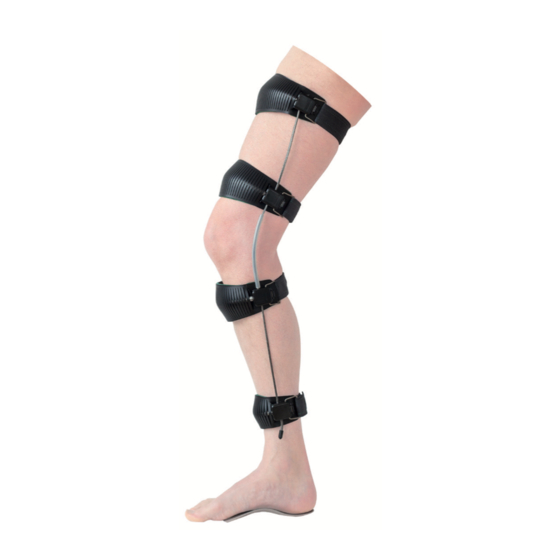Ambroise UTX-STABIL Manuel - Page 8
Parcourez en ligne ou téléchargez le pdf Manuel pour {nom_de_la_catégorie} Ambroise UTX-STABIL. Ambroise UTX-STABIL 18 pages. Orthosis

ITEM NUMBERS
UTX Lateaal Left:
400420
UTX Lateral Right:
400421
UTX Medial Left:
400422
UTX Medial Left:
400423
UTX-ESF Lateral Left:
400500
UTX-ESF Lateral Right:
400401
UTX-ESF Medial Left:
400402
UTX-ESF Medial Right:
400503
OPERATION OF THE SWING
The UTX-SWING is locked against flexion and extension during the stance phase of walking.
At the end of the stance phase the knee hinge automatically unlocks. During the swing phase a
natural knee flexion is possible. If the leg extends again at the end of the swing phase, the knee
falls automatically into it's lock again.
Locking
The UTX SWING falls into it's lock when the knee hinge is sufficiently stretched. A ratchet
jumps into the lock position prohibiting further bending of the knee. An extension stop in the
hinge prevents overstretching of the knee.
Unlocking
The knee hinge of the UTX-SWING orthosis is kept locked by a ratchet. The hinge will remain
locked until the end of the stance phase of walking. Then, the hinge is unlocked automatically. In
order to unlock the knee hinge at the end of the stance phase, you need to simultaneously reach
two conditions: First, a small dorsiflexion with the ankle (minimum of 5 degrees) should be made.
This is a normally occurring ankle motion during the stance phase when the foot remains on the
floor and the leg moves forward. This is what happens in the UTX: the ankle hinge is attached to
the ratchet in the knee hinge via a cable. This ratchet can only be pulled from the lock when it is
released. This requires a (very small) knee extension. This is the second condition that must be
met. If either is missing, the knee hinge will not be unlocked.
Stretching the knee
Research has shown that stretching the knee at the end of the stance phase is part of normal
human gait. So the movement is natural. It requires certain residual functions. Persons who are
in possession of these residual functions, usually learn to master the technique as described
above. Persons who do not have sufficient rest function(s), can generally make optimal use of a
UTX-STABIL orthosis (optionally in combination with UTX-ESF)
There are three ways to stretch the knee at the end of the stance phase:
1.
Stretching the hip with still present (partially) active hip extensors (3 MRC muscle strength
is required), in particular, M. gluteus maximus, (Hamstrings: M. Semimembranosus and
Semitendinosus, and M. Biceps femoris).
2.
Stretching the knee with still present (partially) active knee extensors (3 MRC muscle
strength is required) M. quadriceps femoris.
3.
By using knee hyperextension. (See also UTX selection protocol.)
In addition to this automatic release, it is also possible to manually unlock the UTX-SWING
Product information | +31 (0)53 4302 836 | [email protected] | www.ambroise.nl
UTX.2018.01
KNEE FUNCTION
SWING / STABIL / FREE
SWING / STABIL / FREE
SWING / STABIL / FREE
SWING / STABIL / FREE
STABIL / FREE
STABIL / FREE
STABIL / FREE
STABIL / FREE
ADDITION
FS / POST / DZ / ESC (SWING only)
FS / POST / DZ / ESC (SWING only)
always FS / POST / DZ / ESC (SWING only)
always FS / POST / DZ / ESC (SWING only)
FS
FS
always FS
always FS
Figure 4: UTX-FS
Figure 5: UTX-ESC
8
